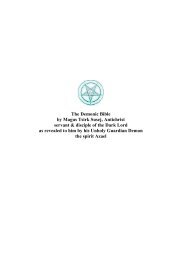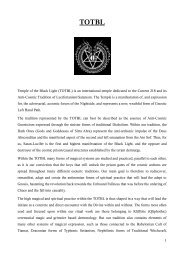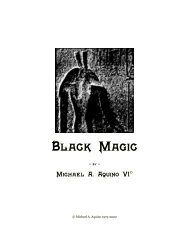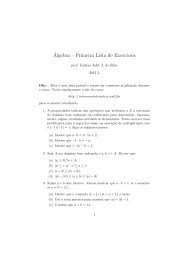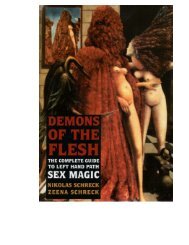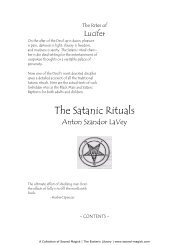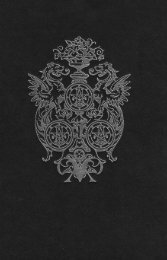Satanism Today - An Encyclopedia of Religion, Folklore and Popular ...
Satanism Today - An Encyclopedia of Religion, Folklore and Popular ...
Satanism Today - An Encyclopedia of Religion, Folklore and Popular ...
Create successful ePaper yourself
Turn your PDF publications into a flip-book with our unique Google optimized e-Paper software.
H<br />
Hades<br />
In the contemporary period Hades has become<br />
interchangeable with hell. However, the name<br />
originally referred to the Greek god <strong>of</strong> the underworld<br />
<strong>and</strong> king <strong>of</strong> the dead. Later Hades became,<br />
by extension, the name <strong>of</strong> the l<strong>and</strong> <strong>of</strong> the dead<br />
itself. Hades was the son <strong>of</strong> Rhea <strong>and</strong> Chronos.<br />
After defeating the Titans (the older gods), Hades<br />
<strong>and</strong> his brothers, Zeus <strong>and</strong> Poseidon, divided the<br />
world among themselves. Poseidon received the<br />
seas, Zeus the sky, <strong>and</strong> Hades the underworld.<br />
Hades was considered so unfortunate that even<br />
the mention <strong>of</strong> his name was regarded as unlucky,<br />
<strong>and</strong> mythological tales about the god <strong>of</strong> the<br />
underworld are scant.<br />
The foundation for Greek classical religion was<br />
set in the Homeric poems, the Iliad <strong>and</strong> the<br />
Odyssey, which themselves were the inheritors <strong>of</strong><br />
older heritages from the Mycenean-Minoan<br />
culture. The chief deity was the Mother Goddess,<br />
who brought both good <strong>and</strong> evil, though even evil<br />
was understood to be part <strong>of</strong> the natural cycle <strong>of</strong><br />
things. This included death, which was believed to<br />
be essential for new life. The Mother Goddess<br />
herself was ruler <strong>of</strong> the nether regions <strong>and</strong> thus a<br />
key element in the cult <strong>of</strong> the dead. At Argos she<br />
was known as Hera (the Lady), at Eleusis she was<br />
known as Demeter (Mother Earth), at Sparta she<br />
was Orthia, <strong>and</strong> at Ephesus she was Artemis.<br />
The epic poem, the Iliad, dating to about 800<br />
101<br />
B.C.E. <strong>and</strong> traditionally assigned to the authorship<br />
<strong>of</strong> Homer, signals the ascendancy <strong>of</strong> the Olympian<br />
gods brought by the Hellenic people. Homer’s<br />
view <strong>of</strong> Hades is reflected in his later work, the<br />
Odyssey, where Odysseus needed to seek advice<br />
from a seer in the l<strong>and</strong> <strong>of</strong> the dead. To do this, he<br />
sailed into the far west (in several cultures this is<br />
where the sun “dies” daily, thus the location <strong>of</strong> the<br />
l<strong>and</strong> <strong>of</strong> the dead) <strong>and</strong> upon reaching l<strong>and</strong> made a<br />
sacrifice <strong>of</strong> sheep covered with honey, milk, water,<br />
<strong>and</strong> wine. The sacrifice brought forth a number <strong>of</strong><br />
ghosts, or shades <strong>of</strong> the dead, who were able to<br />
converse with Odysseus only after drinking the<br />
blood <strong>of</strong> the sheep. Homer had the ghost <strong>of</strong><br />
Achilles tell Odysseus that he would rather be a<br />
peasant serf on earth than a king among the dead.<br />
The House <strong>of</strong> Hades was pictured as a large<br />
cavern under the earth somewhere or in the far<br />
west beyond the river Oceanus. It was not a<br />
happy place, but shrouded in mist <strong>and</strong> darkness,<br />
<strong>and</strong> figures move about as in a dream. Hades was<br />
separated from the l<strong>and</strong> <strong>of</strong> the living by five<br />
rivers—Lethe (the river <strong>of</strong> forgetfulness), Styx,<br />
Phlegethon, Acheron, <strong>and</strong> Cocytus. The entrance<br />
was guarded by Cerberus, a terrifying hellhound<br />
with three heads <strong>and</strong> serpents around each neck.<br />
The psyche (or life essence, shade, or ghost) <strong>of</strong><br />
the deceased would leave the dead body <strong>and</strong><br />
travel to that place to lead a pallid, weak, melancholy<br />
existence.




